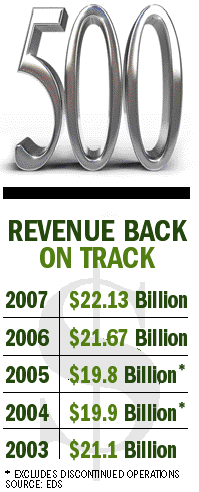EDS: Number One Top Level Performance
The view from the top looks pretty good to Ron Rittenmeyer.
Once again, Electronic Data Systems (EDS) tops the VARBusiness 500 this year with 2007 annual revenue in excess of $22.1 billion. And, despite an impending U.S. recession, the Plano, Texas-based IT integration and services giant's chairman and CEO sees little on the horizon that could knock the company from its lofty perch.
"We know there are economic issues, but I don't wake up with the exact same concern [as CEOs in other industries]," Rittenmeyer said. "We are not a discretionary spend. People have to run IT. They have to collect payments. They have to make payments. They have to process stuff. And we run the backbone."
EDS' global reach and the stability afforded by long-term customer contracts shield the company from economic uncertainty, Rittenmeyer added. He pointed out that EMEA and Asia Pacific are performing well despite some pressure in the United States.
"People cut budgets in times of uncertainty," he acknowledged. "Nobody is recession-proof. But when it comes to business in general, we tend to be more resilient. In good times, we are there to provide processes and tools to accelerate growth. In bad times, we provide tools and processes to deal with cost controls."
In fact, Rittenmeyer said that he is seeing reasonable growth across all industries with particular strength in manufacturing and energy sectors.
But what propelled EDS to the top of the VARBusiness 500 and what Rittenmeyer vows will keep it there is a focus on operational excellence and solutions rather than an allegiance to specific vendors.
"We are a company that is very much about fundamentals," he said. "My view is that there is such a thing as zero outages. We need to get to that stage. We are really focused on hitting 99.99 percent, and that's the approach you have to take."
And EDS has taken what Rittenmeyer calls an agile enterprise solutions approach. "The agile enterprise platform builds on a best-of-breed solution, so we are not tied to any specific equipment. It's about continuing to provide the best solution to the customer and not just my solution."
He noted that network management and enterprise service management would continue to drive growth for the company in 2009. And mission-critical security systems will be in high demand as well. "Security is now a mainstream part of the business vs. an afterthought," he said.

EDS, too, is pushing its Design for Run strategy, which focuses on the total cost of ownership and long-term cost savings for customers. "It's important to not only look at the solution but how you build for ongoing operational costs," Rittenmeyer said. "What you need to worry about is the annual cost, the repetitive cost to run systems. We work hard when designing something, so our clients know when we install it what the cost is to run it."
He noted, too, that green technology is taking hold in corporations and that EDS is putting a lot of effort around designing and building green data centers for customers. And Rittenmeyer said EDS would continue to make acquisitions in 2009.
"We will make selected acquisitions in certain industries," he said, noting that last year EDS bought Saber Holdings, a provider of software and services to U.S. state and local governments. "We will continue down that path as part of our strategy to grow."
Apart from that, Rittenmeyer said he wants to build on the company's strategy to serve customers on an industry-by-industry approach, putting more muscle into building higher value, industry-specific solutions. "We have tight industry point solutions, and we want to continue to build on that and then continue to move up the value chain. We want to be a broader provider than we have been in the past," he said, noting that EDS will become more industry-aligned rather than geographically aligned over time.
Rittenmeyer said that EDS has managed to dodge the industrywide problem of attracting and retaining top IT talent. "It hasn't been a problem, but it's a never-ending issue," he said. "You are always looking for the right people in the right place. Of all of our top performers last year, we retained in the high 90 percent range. I'd like it to be 100 percent but it never is. And we recruited some top people as well. You just have to be thoughtful and take your time."
Of the challenges EDS and other solution providers face in the future, Rittenmeyer is most concerned about the impact aggressive pricing could have on the IT services industry. "The days of, 'We'll take your mess for less' are over," he said. "CIOs are getting much more attuned to the fact it just isn't about how can I save some money and it isn't about labor arbitrage by going overseas. It's about designing stuff that can run on an ongoing basis with sustainability and cost savings that are sustainable. Many times, that's not the cheapest solution."
But Rittenmeyer acknowledged that IT services is a very competitive business and the quest to do deals at the lowest possible price could hurt innovation in the marketplace.
"If pressure is brought on companies to price to a point where there is nothing in it for them, people are going to make less investments [in designing innovative solutions]," he said.
"For the benefit of the industry and the client, there has to be enough capital to make the right R & D investments so that you are adding value in terms of a solution that can be repeated in other companies."